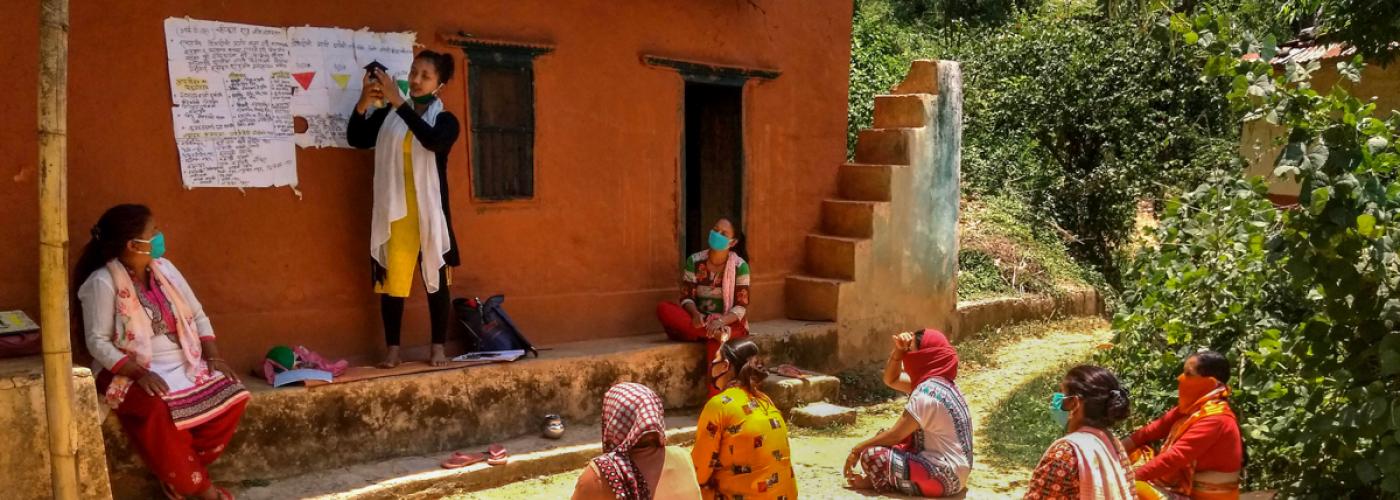Assessing the Impact of COVID-19 on Farmers and Private-Sector Partners in Nepal
Image

This post shares a rapid market assessment on the impact of COVID-19 on farmers and private sector partners in Nepal. It was conducted by the Feed the Future Knowledge-Based Integrated Sustainable Agriculture in Nepal (KISAN) II Project.
When the global COVID-19 pandemic began to spread in early 2020, the Government of Nepal imposed a strict preemptive lockdown to protect its citizens and curb the spread of the disease. The lockdown started on March 24, 2020, when there was just one confirmed case in the country, requiring people to stay in their homes, banning most vehicular movement, and forcing all non-essential businesses to close shop. The lockdown was extended seven times, through June 14, protecting the population from disease exposure, but also offering little economic relief to struggling businesses and households.
The COVID-19 crisis and subsequent lockdown has taken a significant toll on Nepal’s economy, and is expected to slow economic growth to as low as 1.5% in fiscal year 2020, compared to 7.1% growth last year. The economic impact and supply chain disruption to Nepal’s already fragile agriculture market system has been especially painful.
The Feed the Future Knowledge-Based Integrated Sustainable Agriculture in Nepal (KISAN) II project conducted a rapid market assessment of its roughly 150 partner agri-businesses and farmers to better understand the impact of the current crisis and the future outlook for the agriculture sector. Looking at a range of actors, including agrovets, cooperatives, millers, traders, crop farmers, and goat farmers, the study found that many share the same challenges as they try to survive during this tough time.

Most agribusinesses and farmers have experienced lost revenues due to a shortage of agri-inputs, decreased trade of agriculture commodities, and increased operational costs. Women and those from disadvantaged groups are disproportionately affected by the crisis. With limited operational hours and restricted access to wholesale inputs, agrovets have seen plummeting sales. With farmers selling less produce, their incomes have decreased, and many are seeking inputs on credit, which further strains agrovets. Cooperatives have seen increased withdrawals of savings by hard-hit farmers and are facing logistical difficulties collecting loan repayments. Traders have seen lower demand for fresh vegetables and an increase in post-harvest loss. Rice mills have experienced limited paddy stock and labor shortages, as well as logistical bottlenecks that limit their access to markets. Many goat farmers are unable to sell pure-bred kids for breeding, forcing them to rear goats for meat, skip a breeding season, or breed with low-quality breeding stock instead. To cope, some goat farms have shifted to more traditional goat feeding practices, relying on forage, fodder, and household waste to feed their herd. To encourage them to rear goats during this challenging time, which will increase their overall resilience in the long-term, KISAN II is also linking them with available input suppliers and facilitating the re-supply of buck semen and liquid nitrogen.

Many agribusinesses have taken steps to adapt to the changing business environment brought on by COVID-19, thus strengthening their resilience against this, and future, shocks. Others need more support transitioning to a more sustainable model. There are many ways KISAN II and its government and development partners are helping to support agribusinesses as they adapt and respond to new constraints, which, in turn, is enabling farmers to continue accessing the inputs and support they need to remain competitive.
- Help agribusinesses identify and form strategic partnerships with financial institutions who can provide loans and inject much-needed liquidity during this crisis;
- Facilitate more efficient payment models, such as Digital Payment Platforms, e-wallets, etc. to help agribusinesses stay competitive and conduct business safely, while limiting strains on cash flow;
- Build long-term resilience among agri-entrepreneurs through KISAN II’s Business Literacy Program by equipping them with the skills needed to anticipate, plan for, and respond to shocks, as well as to adapt their business models;
- Link rice mills, large wholesale agrovets, and feed mills with business development services to help them adapt and transition their business operations to a more efficient post-COVID-19 market; and
- Ensure farmers’ reliable and safe access to valuable agri-inputs and technical support by helping agribusinesses explore innovative ways to reach customers while avoiding group-based activities (i.e. SMS dissemination, virtual outreach, and store-to-farm input delivery). Preventing a disruption in production during the critical planting season will limit farmers’ continued vulnerability post-lockdown.

